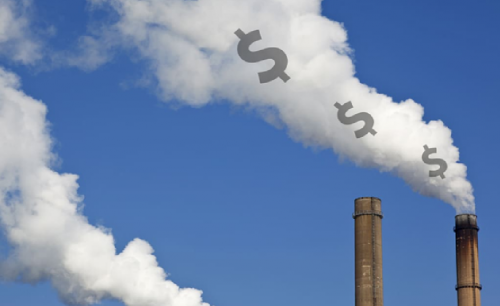Carbon Tax Drives Energy Prices Higher (Article)
Mark Mathis*

Don’t you just hate it when great intellects fail to see what should be clear? It’s even more disappointing when extremely smart people take a position on how to solve a problem, but then don’t fully explain how their favored solution will work.
This is the frustration I go through every time I read a column by Holman Jenkins of the Wall Street Journal where he pushes the idea of a carbon tax.
He did this again on June 10, 2022. On most subjects Mr. Jenkins provides brilliant insight that is lacking at the New York Times, Washington Post, and other major newspapers.
He is especially incisive on energy.
climate change
Jenkins understands energy and the implications of climate change hysteria better than the vast majority of keyboard bangers who call themselves “journalists.” But when it comes to the viability of a carbon tax, Jenkins has an uncharacteristic blind spot.
In his June 10 column Jenkins states that, “For 30 years, every economist of note has explained why a carbon tax is the efficient way to moderate emissions.” I think that’s a stretch, but it’s not worth arguing about.
The problem with Jenkin’s analysis is that he is citing the wrong authorities. In general, economistsaren’t all that reliable. For evidence of that, consider the U.S. Secretary of the Treasury was claiming inflation would be transitory even after it was busting through all historical records with no sign of slowing down.
energy and goods
Economists have a well-earned reputation of looking at economic conditions from an academic point of view, as opposed to how economics works in the real world.
This problem is compounded when it comes to energy because economists tend to treat energy like they would any other consumer good. That’s a giant error, of course, because energy is the fundamental input for all goods.
The argument for a carbon tax goes something like this: Tax carbon-based energy such as oil production, refining, mining, and shipping. The increased tax on these activities will produce more money for the government while making them more expensive.
 carbon-based fuels
carbon-based fuels
The increased expense will cause consumers to use a lesser amount of carbon-based fuels. Some carbon tax schemes stipulate that a portion of the tax be refunded to consumers to offset the extra expense of higher fuel, electricity, and other product costs.
The first reality that undermines this fantasy is the fact that many nations in the world will simply not go along with a carbon tax.
China, India, all of the African continent, and dozens of other nations have a long way to go before they reach the standard of living enjoyed by advanced economies. Leaders in these countries have every incentive to use as much oil, natural gas, and coal as possible as they build the infrastructure they need to advance.
there are no viable alternatives
If developed nationsare dumb enough to impose a carbon tax on themselves, developing nations will be thrilled.They will simply exploit higher quantities of fossil fuel at a lower cost.
Beyond this unsurmountable political obstacle there is the issue of alternatives. Economists, journalists, and politicians make the ignorant assumption that driving up the cost of carbon-based energy will naturally create a new market for lower cost competitors.
But energy isn’t like other commodities. In most cases there are no viable alternatives. Making steel requires coal. Most forms of transportation use liquid fuels derived from oil. Jets need jet fuel. Big rigs, ships, and trains run on diesel.
Cars and trucks run on gasoline and diesel. There are no economically viable alternatives. None. What about electric vehicles? Sure. Try building one or creating the infrastructure they need without fossil fuel.
Then there is the issue of all the products made from oil and natural gas, most notably plastics and synthetic rubber.
supply chains
There are no alternatives to products made from petrochemicals that would work on any meaningful scale. If the pandemic showed us anything, it was that supply chains are more fragile than we thought.
A shortage of microchips or fertilizer or any one of the countless parts that go into the countless products we use will stop production of those products.
Impose unreasonably high costs on the fuels that are essential to most products and watch supply chains everywhere melt down.
There are dozens of other reasons that a carbon tax would be massively destructive and ineffective.
If a carbon tax were imposed, manufacturing costs would increase significantly sending corporations and the jobs they offerto nations with cheap labor and cheap energy.
The economies in today’s developed nations would quickly become less prosperous and less powerful.
a carbon tax is such an unworkable idea
Will citizens tolerate their standard of living being driven down because of political incompetence?
The thing I don’t understand is why I can see so many reasons why a carbon tax is such an unworkable idea and yet the otherwise brilliant Holman Jenkins and hordes of economists cannot.
If they can explain away all the giant obstacles to a carbon tax that I’ve pointed out (and so many others) I’m certainly willing to listen. I’ve been willing to listen for many years now. I’m still waiting and listening.
*Mark Mathis, Speaker, documentary filmmaker, video producer, and author in energy.
READ MORE.
- Deceptive Solutions for Fossil Fuel Dependence Drive Prices Higher (Article)
- The Biden Administration’s policies have pushed gasoline prices higher (Article)
- (Article) The Top 5 Reasons Behind Fruitless Energy Policies









